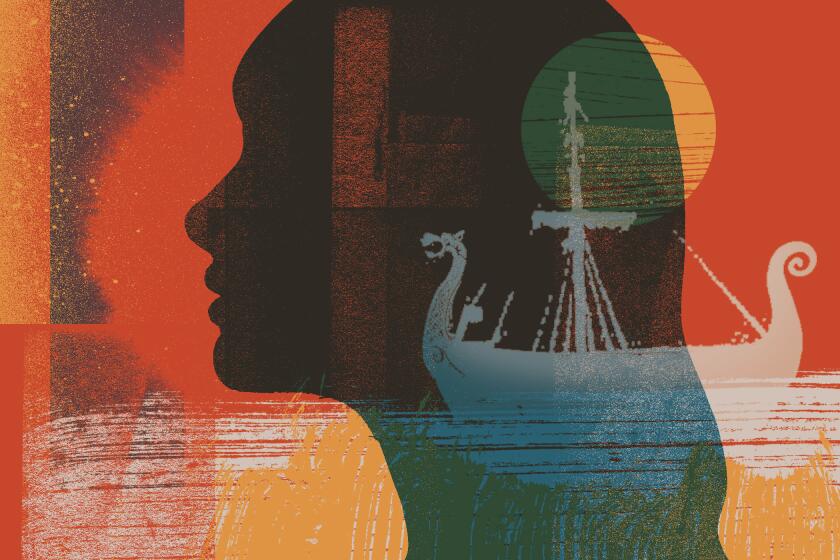He overcame addiction and had three strokes before age 40. Then it got worse
- Share via
On the Shelf
Model Citizen: A Memoir
By Joshua Mohr
MCD/FSG: 336 pages, $27
If you buy books linked on our site, The Times may earn a commission from Bookshop.org, whose fees support independent bookstores.
Most stories about archaeology turn out to be about mortality in the end. Joshua Mohr’s new memoir, “Model Citizen,” has it the other way around, both literally — his duplicitous father quits the ministry to dig up bones — and as a meditation on medical emergencies that excavates the distant past. Any one of the memoir’s ingredients — addiction, fatherhood, near-death experiences — would make for a compelling book. Taken together, they constitute a powerhouse work, one haunted by the traces that people in Mohr’s life have left behind.
Following a series of acclaimed novels about abuse, addiction and communities both physical and online — including “Damascus” (2011) and “All This Life” (2015) — Mohr, now 44, turned his focus to his own life with his 2017 memoir, “Sirens.” That journey through addiction and recovery, depicting alcohol-fueled misdeeds and harrowing scenes of drug abuse, culminated in having three strokes before he turned 40. Unhappily, there was more material to come.
“I wouldn’t have written ‘Model Citizen’ if I hadn’t had the fourth stroke,” Mohr recalls in a phone conversation from his home in Seattle. In 2015, Mohr learned that he has an 8-millimeter hole in his heart, which dramatically increases the odds that a blood clot will travel to his brain. Adding irony to injury: Following surgery to repair his heart, he is prescribed fentanyl. It’s not for nothing that the second part of “Model Citizen” is called “The Freelapse.”
After moving with his family from San Francisco to Seattle, Mohr suffers a fourth stroke, which he describes as chillingly mundane: At home watching a John Cassavetes film one afternoon, he feels his arm go numb. Following another round of treatment, doctors tell him he’s unlikely to live past his 40s. For Mohr, it’s a reason to double down on what he’s accomplished.
They might have been no second memoir if not for Daphne Durham, a fellow Seattleite who would up becoming his editor. “We were brought together by my former colleague Tom Nissley” — who had worked with Durham at Amazon Books. Nissley owns a Seattle bookstore, where one day Durham picked up “Sirens,” a staff pick, and “just fell in love with Josh’s voice immediately,” she says. “He’s so...open. So available and engaging and funny and honest (maybe a little too honest).... I knew I had to find a way to work with him.”
Nissley made the introduction. “That first time we met,” Durham recalls, “we got into a long meandering conversation about sobriety and how he was supposed to be ‘fixed’ but didn’t feel fixed, and that turned into a conversation about what it means to be a ‘good person’ and a ‘good dad’ or a ‘good husband.’ And we somehow spun that out into an idea about expanding ‘Sirens’ to tell the rest of his story.”
The first half of “Model Citizen” covers the same territory as “Sirens,” including a host of misadventures that can be jarring to read about: a cocaine nosebleed that interrupts his teaching of a writing class; a sequence in which he and a friend repeatedly staple each other’s bodies. But the second half puts the past in a very different context; it’s about the perils of being sober, yet sick, and being the father of a very young daughter — in other words, of having something to lose.
“Hollywood Park,” a new memoir from the frontman for the Airborne Toxic Event, recounts his childhood in L.A.’s Synanon cult — and his recovery.
“I never thought about ‘Model Citizen’ as an addiction memoir,” Mohr says. “I think about it as a relapse memoir. That might seem like splitting hairs, but to my tribe, there’s a really important distinction there.”
The second memoir is structured around a lifetime of relapses; where “Sirens” ended on a note of wary optimism, with Mohr ostensibly healed, “Model Citizen” lingers on the shortcomings of body and mind.
“In one way or another — existentially speaking — we are all unrepairable, right? I’m unrepairable for my addict brain, but I’m also unrepairable for my literal and very metaphorical flawed human heart,” he says. “So it seemed like those raw materials would have a really dynamic conversation if I was able to put them in discussion with each other.”
Mohr’s first creative forays were in a different medium. “I had the greatest apprenticeship in the world for being a writer — I’m a failed musician,” he says. “On one hand, it’s great because I’m used to people not liking my art; it’s like I played a set and there are only six people in the club. And then afterwards I’d say, ‘Do you want to buy my CD?’ And they’d say, ‘No, I didn’t even want to listen to your band in the first place.’”
There were more technical lessons that carried over to writing, particularly nonfiction, which in his mind depends more on an authentic voice than professional gloss. “I left a lot of edges unsanded in the book that I would have fixed in a novel,” he says. “I want it to sound like a Bad Brains song. The singer is a little hoarse; the drummer is on coke, so he’s speeding up and slowing down. This artifact shouldn’t be perfectly in tune.”
Mohr generally listens to the Cramps when writing first drafts, but for revisions, he turns to the more polished Flaming Lips — a group whose career serves as inspiration as well.
“They’re this little band from Oklahoma,” says Mohr, “and because they’re off the map, it allowed them to just hide in this corner and get really good at their version of writing a song.”
If “Model Citizen” were a song, it might be a ballad by Nick Cave, a piece of drama inviting readers to sympathize with the devil on his shoulder, maybe even sit in its place.
“You’re going to see me doing some questionable things,” Mohr says. “And if I’ve done my job right, I’m whispering the story to the reader in such a way that she’s going to feel complicit in the action too. I want her on my shoulder, especially in parts three and four, to be like, ‘Man, you’ve worked so hard for this. Are you really this stupid?’”
Nina Renata Aron’s memoir, “Good Morning, Destroyer of Men’s Souls,” doubles as an ennobling history of recovering enablers of addiction.
While “Model Citizen” explores the limits of self-discipline in extremis, its most emotional moments emerge from relationships — particularly those with his father, whose death at 52 from lung cancer haunts the book, and his mother, whose history with alcoholism leads to one of the book’s most profoundly unsettling moments. It wasn’t until he and his mother had both gotten sober, Mohr says, that they could repair their relationship.
“At this point she’s been clean 30 years, and I’ve got 11 now,” he says. The bond “has never been as good as it is right now. We text all the time. We talk every week, and that’s never been a part of our story.”
“I want it to sound like a Bad Brains song. The singer is a little hoarse; the drummer is on coke. This artifact shouldn’t be perfectly in tune.”
Mohr’s descriptions of his father pack their own punch. “I’m writing about him quitting the ministry because of the divorce and then going to get a PhD in archaeology,” he says. “I talk about him being Indiana Jones — and who wouldn’t want to be Indiana Jones?” Mohr says. “But there was caustic irony there — how can you be into archaeology if you’re a pathological liar?”
What Mohr means is that his father would have been better off digging up skeletons closer to home. “He never wanted the bones of his mistakes excavated.” Late in the book, Mohr learns the real reason his father left the family when he was young, and it fundamentally alters the narrative Mohr had told himself about his childhood.
His own paternal approach is a reaction to that. “I’m telling Ava way too many things that she probably doesn’t ever want to know, but that’s her job,” he says. “She gets to be the archaeologist someday, if she wants to.”
The end of “Model Citizen” finds Mohr facing an uncertain future and doing his best to avoid another stroke. For him, this book isn’t simply a memoir — it’s a document of his life for his daughter.
“If my cardiologist is right and I don’t live out of my 40s — and I don’t have the pleasure of getting to watch her grow up — I want her to have some sort of official record of my short time here,” he says.
Emily Rapp Black lost her toddler to Tay-Sachs disease. She talks to a fellow griever about ‘Sanctuary,’ her follow-up memoir about rebuilding a life.
For now, Mohr has a different project in mind, a historical novel set in San Francisco during the Gold Rush. “It had eight to 12 murders a night,” Mohr says. “Bodies were getting heaved into the middle of the road.”
“My agent said, ‘You can’t write another bar book.’ And I thought, how can I work around this? I’ll put it in the Old West, because they’re wearing hats, it’s a different story,” he says with a laugh. “It’s still very much a bar book.” And it’s still, in its bones, a work of archaeology.
Carroll is the author of the books “Political Sign,” “Reel” and “Transitory.”
More to Read
Sign up for our Book Club newsletter
Get the latest news, events and more from the Los Angeles Times Book Club, and help us get L.A. reading and talking.
You may occasionally receive promotional content from the Los Angeles Times.









